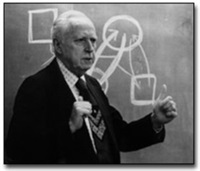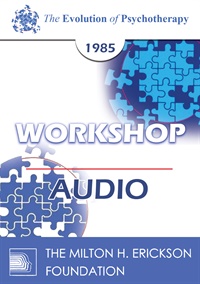EP85 Workshop 19 - Family Systems Therapy - Murray Bowen, MD
- Average Rating:
- Not yet rated
- Topic Areas:
- Workshops | Family Systems | Family Therapy | Psychotherapy
- Categories:
- Evolution of Psychotherapy | Evolution of Psychotherapy 1985 | Pioneers in Couples and Family Therapy
- Faculty:
- Murray Bowen, MD
- Duration:
- 2 Hours 28 Minutes
- Format:
- Audio Only
- Original Program Date:
- Dec 13, 1985
- License:
- Never Expires.
Description
Description: A workshop focusing on a strategic family therapy case by exploring marital conflict, individual growth, and emotional differentiation through systemic therapeutic intervention. Concludes with a comprehensive exploration of family systems therapy.
Syllabus Description: Some of the cardinal principles in Family Systems Theory will be presented. It is important to diagnose the emotional posture of principal family members. A videotape of family therapy will be presented and discussed.
Educational Objectives:
- To know techniques so that therapists no longer take sides in the intense family emotional process
- To estimate the emotional posture of principle family members
*Sessions may be edited for content and to preserve confidentiality*
Credits
Faculty

Murray Bowen, MD Related Seminars and Products
Murray Bowen (31 January 1913 in Waverly, Tennessee – 9 October 1990) was an American psychiatrist and a professor in psychiatry at the Georgetown University. Bowen was among the pioneers of family therapy and founders of systemic therapy. Beginning in the 1950s, he developed a systems theory of the family. From 1954 to 1959, Bowen worked in the National Institute of Mental Health, Bethesda, Maryland, where he continued to develop the theory that would be named after him: Bowen Theory.[4] At that time, family therapy was still only a by-product of theory. Bowen did his initial research on parents who lived with one adult schizophrenic child, which he thought could provide a paradigm for all children. After defining the field of family therapy he started integrating concepts with the new theory. He claimed that none of this had previously been described in the psychological literature. What began the first year became known nationally in about two years.
From 1959 to 1990 he worked at the Georgetown University Medical Center in Washington DC as clinical professor at the department of Psychiatry, and later as director of Family Programs and founder of a Family Center.


